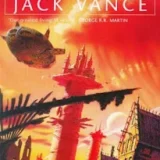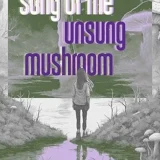
Who wouldn’t want to take another trip with H.G. Wells and face those wretched monsters from Mars? Better yet, how about a brand new journey with some old characters and new ones? If you’re as excited about the chance as I was, then there may be just the book available for you.
With a Steampunk undertone, The Martian War by steampunk, Victorian England, Kevin J. Anderson turns out to be more of a literary retrospective of H.G. Wells the man rather than a story based on just the original War of the Worlds. The central plot does take place in Victorian England during the epitome of the industrial revolution and displays the sense of inventiveness familiar to the Steampunk field, but the overall tone of the book is focused elsewhere. Within the first few pages, the reader gets a better feel for the general plot and the ties it holds with War of the Worlds. The Martian War is definitely a fresh take on the on the original invasion and gives a few nods to other works by H.G. Wells.
The title and cover art hint at a continuation or sequel to the original story of the late nineteenth century. But the unique cast of characters involved in the The Martian War, both historical figures as well as fictional (from the mind of Wells), lends to this new perspective. Thanks to the fact that some of Wells’ fictional characters have become familiar to us with historic proportions, the believability of such a story is reinforced.
The likes of real life biologist evolutionist T.H Huxley and astronomer Percival Lowell play key roles in the story. Along with the Martian invasion thing and an examination of the author’s relationship with Amy (Jane) Catherine Robbins, H.G. Wells himself is crucial to the plot. But fact, fiction and overall twists of reality take a surprising turn with the appearances of Wells’ own literary creations like vivisectionist Dr. Moreau and Hawley Griffin, the invisible man.
A quick aside here – it is a bit awkward that people address the character Wells as H.G. rather than Herbert George. Now there are plenty of PJ’s and TJ’s out there and it all sounds natural, but close (and intimate) friends calling him H.G. seemed out of character. I do not claim to have extensive knowledge of Wells’ personal preference, but if this was the case (and if I missed something while reading), a quick note might put the reader at ease. Just sayin’.
Though a lot of creative concepts of Martian invaders including superior technologies and tripedal vessels stem from the original Wells story, Anderson takes a different approach with his own unique plot. With the eminent threat of war in Europe, scientists from both sides scramble to become more efficient than their enemy in technological advances. But inevitably, accidents happen and H.G. Wells finds himself stranded on Mars with some friends (thanks to the antigravity Cavorite familiar to fans of Wells’ The First Men in the Moon – see Amazing Stories volume 1, no’s 9-11…go ahead, you know you want to!), and he witnesses the staging plans of the future invasion of Earth.
There is a lot more that goes on in the book, including a fascinating look at the personal journal of Dr. Moreau as he and Lowell take in a Martian who crash landed on Earth. The action is both horrific and humorous as humans interact with beings stranded from outer space. It also makes for interesting comparison as the reader experiences both sides of the experience – the Martian here on Earth and Wells and his friends on Mars. Deciding who the true enemy is comes down to intentions and compassion – something Anderson skillfully blurs at times.
Not a true prequel/sequel tie in, The Martian War published by Titan Books is more of a look back at the possibility of how Wells came up with the story. The way it is told by Kevin J. Anderson, The Martian War could have been the inspiration behind Wells’ War of the Worlds. After all, since the invasion was all hush hush because of the inevitable war in Europe, Wells had to take artistic licenses and change it up a bit – to eventually become the story we all grew up with. Yes, it will be difficult for a reader to not stop and ponder – so THAT’s where Wells came up with that. Ah, the conspiracy theorists will be jumping at this one in droves!
So the next time you read something new in Amazing Stories, think of this book when you take a step back to ask yourself if it is truly fiction, or something merely twisted from an actual account










I agree. Great Review. Entertaining, speculative, and you overcame my vice: judging a book's cover.
Reading the review, I was reminded of Christopher Priest's 1970s playing around with H.G.Wells in 'The Space Machine' (which I think also involved the Martians)
Great review. It really makes me want to read the book.
Right now I'm working on a post about the popularity of steampunk and the Victorian period is so attractive to today's writers. It's not because the period saw the first science fiction novels. Maybe it's because we live in a society that's similarly bifurcated economically, with an ultra-rich 1% at the top and the other 99% being pushed into poverty and squalor.